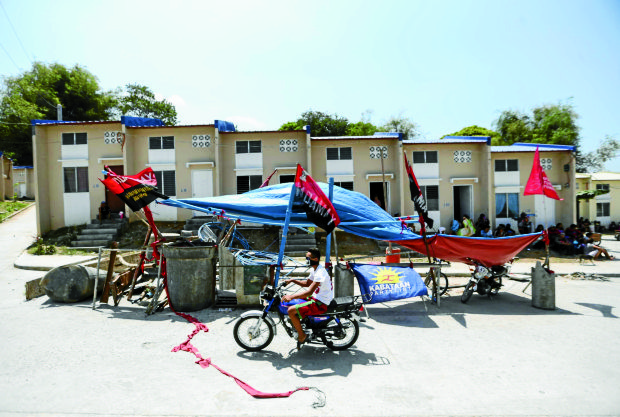Leave or be evicted, Bulacan settlers told

The urban poor group Kadamay puts up a makeshift camp in front of housing units in Pandi, Bulacan, now occupied by settlers from Metro Manila. —LYN RILLON
CITY OF MALOLOS—Saying that families who occupied idle government housing projects in Bulacan province on Wednesday stole houses meant for other urban poor, the National Housing Authority (NHA) on Friday gave them seven days to leave or face the consequences.
During a dialog initiated by Bulacan provincial government and housing officials, Rommel Alimboyao, NHA Central Luzon manager, said the families would be given eviction notices next week. But he assured them their applications for housing would be addressed.
On Wednesday, urban poor families from Metro Manila, aided by members of the Kalipunan ng Damayang Mahihirap (Kadamay), occupied 5,000 houses in Villa Elise at Barangay Masuso, Pandi Village 2, at Barangay Mapulang Lupa, Villa Louise at Barangay Cacarong Matanda, and Padre Pio at Cacarong Bata, all in Pandi town; and some units at San Jose Heights in the City of San Jose del Monte.
Some of these houses had been set aside for soldiers and policemen, said Col. Ramil Anoyo, commander of the Army’s 48th Infantry Battalion, who led a unit to secure the housing projects.
“Soldiers also have to wait because there is a process in acquiring houses,” Anoyo said, adding that many beneficiaries of these projects had felt that “they were robbed.”
Article continues after this advertisementAlimboyao said the NHA was also validating reports that the takeover was part of an orchestrated move to discredit the Duterte administration.
Article continues after this advertisement“We will see if there is somebody or a group that is behind this [takeover of housing projects],” he said.
The insinuation upset Gloria Arellano, Kadamay national chair, who said that “nobody was manipulating us.”
“People are impatient. They want their own homes. It has taken so long for the government to address our appeal for housing and yet people are aware those [low-cost] houses are empty so they took them,” she said.
She urged the NHA to allow the families to keep the houses while their housing applications were being processed. —CARMELA REYES-ESTROPE